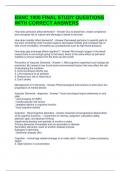Exam (elaborations)
BSNC 1000 FINAL STUDY QUESTIONS WITH CORRECT ANSWERS
- Course
- Institution
BSNC 1000 FINAL STUDY QUESTIONS WITH CORRECT ANSWERS How does perfusion affect dementia? - Answer-Due to blood flow, vessel compliance and increased risk of rupture and blockage of blood to the brain How does mobility affect dementia? - Answer-Decreased perfusion to specific parts of the brain ...
[Show more]



